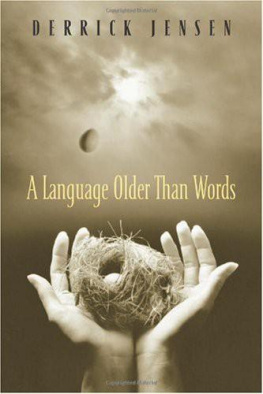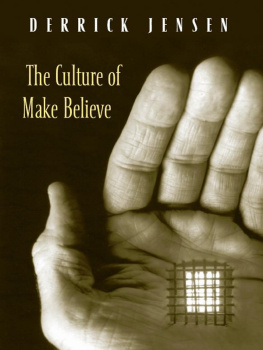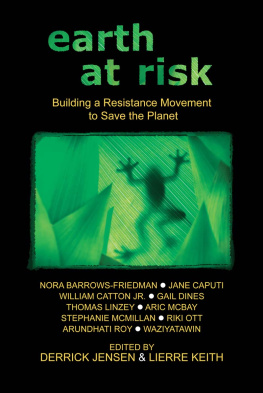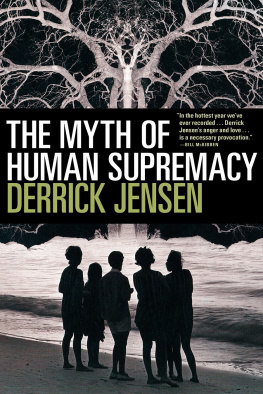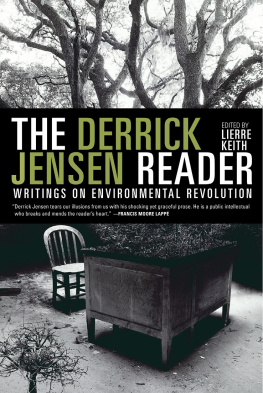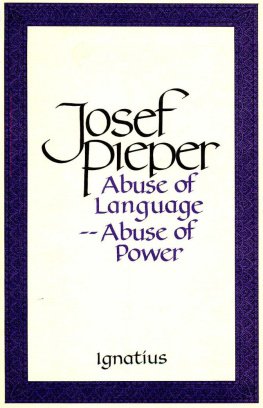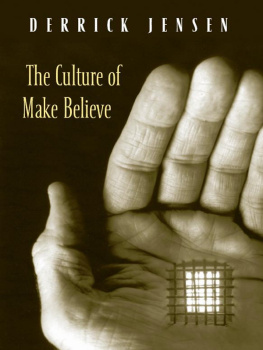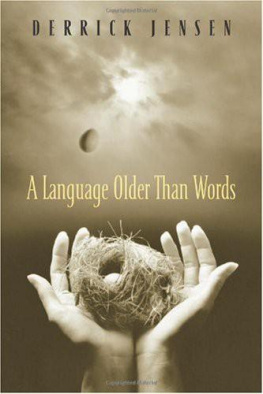Derrick Jensen - A Language Older Than Words
Here you can read online Derrick Jensen - A Language Older Than Words full text of the book (entire story) in english for free. Download pdf and epub, get meaning, cover and reviews about this ebook. year: 2004, publisher: Chelsea Green, genre: Art. Description of the work, (preface) as well as reviews are available. Best literature library LitArk.com created for fans of good reading and offers a wide selection of genres:
Romance novel
Science fiction
Adventure
Detective
Science
History
Home and family
Prose
Art
Politics
Computer
Non-fiction
Religion
Business
Children
Humor
Choose a favorite category and find really read worthwhile books. Enjoy immersion in the world of imagination, feel the emotions of the characters or learn something new for yourself, make an fascinating discovery.
- Book:A Language Older Than Words
- Author:
- Publisher:Chelsea Green
- Genre:
- Year:2004
- Rating:5 / 5
- Favourites:Add to favourites
- Your mark:
- 100
- 1
- 2
- 3
- 4
- 5
A Language Older Than Words: summary, description and annotation
We offer to read an annotation, description, summary or preface (depends on what the author of the book "A Language Older Than Words" wrote himself). If you haven't found the necessary information about the book — write in the comments, we will try to find it.
A Language Older Than Words — read online for free the complete book (whole text) full work
Below is the text of the book, divided by pages. System saving the place of the last page read, allows you to conveniently read the book "A Language Older Than Words" online for free, without having to search again every time where you left off. Put a bookmark, and you can go to the page where you finished reading at any time.
Font size:
Interval:
Bookmark:
A Language Older Than Words
DERRICK JENSEN
Contents
Preface4
Silencing6
Coyotes, Kittens, and Conversations17
Taking a Life26
Cultural Eyeglasses30
Cranes43
The Safety of Metaphor47
Claims to Virtue56
Seeking a Third Way69
Breaking Out85
Economics94
The Goal Is the Process101
Heroes106
Metamorphosis115
Insatiability119
Violence129
The Parable of the Box139
Violence Revisited145
Coercion157
Honeybees162
A Turning Over166
A Life of My Own174
Interconnection179
The Plants Respond188
Death and Awakening197
A Time of Sleeping205
Out of Mourning, Play218
Trauma and Recovery221
Connection and Cooperation232
Acknowledgments240
Notes on Sources242
Bibliography250
Preface
THE GENESIS OF THIS book was an event. I used to raise chickens and ducks for food. After a couple of years, a pack of coyotes discovered the easy meals, and I began to lose birds. I scared the coyotes away when I happened to be home, but I knew I could not forever stand guard. One day, when I saw a coyote stalking chickens I asked it to stop. I did this more out of frustration than conviction.
The odd thing was, the coyote did stop, and neither it nor other pack members returned. I was skeptical about the signifi cance of this. Indeed, it took quite a long time and many more interactions with the coyotes before I began to suspect that interspecies communication might be real. This created a new concern. What I was experiencing went against everything I'd been taughtat school, on television, at church, in the newspa perand especially went against my training in the sciences.
I began to question my sanity, which further piqued my curiosity.
Crazy or not, I soon discovered I wasn't alone. I began to ask people if they too experienced these conversations, and over whelmingly they said yes. Pigs, dogs, coyotes, squirrels, even riv ers, trees, and rocks: all these, according to the stories I was hear ing, were speaking and listening if only we too would enter into conversation. Almost without exception, the people I asked said they'd never told these stories, for fear that others would think they were crazy.
The path for the book seemed clear: I would document these stories so that others could learn through the number, variety, and dailiness of these interactions to begin trusting that their own experiences of interspecies communication might be real. I hoped they would learn that just because they speak to their tabby, or because their cocker spaniel responds to their words and intents, that they may not be crazy after all. Or at least if they are crazy , far from being alone they outnumber the skepti cal sane.
What promised to emerge from this exploration was a feel- good book. It seemed to have New York Times bestseller list written all over it.
I tried to write that book, and couldn't do it. Not if I wanted to be honest. One reason is that the conversation with the coy otes was not in truth my first interaction of this kind. It was simply the most obvious I'd experienced in a long time. I recol lected that as a child, I had routinely participated in this sort of conversation, listening especially rapt to what the stars had told me almost nightly. I remembered in fact that the stars had saved my life.
Soon it became dear that an honest examination had to be gin further back than my experience with the coyotes. At the very least it would need to start with the story of the stars. And in order to fully tell that story, I would also need to tell the story of my childhood; how I came to listen to the stars, and why their message was important to me.
At that point another storyline emerged, and it became clear that what I had to write, regardless of my relative youth, was a memoir: How did I later come to deny my experience in favor of what I had been taught? How and why does this happen to each of us as we grow up? Suddenly the book took on epic propor tions. Question led to question, each one more difficult and dis turbing than the one before. How and why do we numb our selves to our own experience!? How and why do we deafen our selves to the voices of others?Who benefits? Who suffers? Is there a connection between the silencing of women, to use one example, and the silencing of the natural world? I wanted to write a memoir that moved beyond the microcosm of my per sonal experience to the macrocosm of the world in which we live.
Thus a second reason I couldn't write the feel-good book. As a long-time environmental activist, I am intimately acquainted with the landscape of loss, and have grown accustomed to carry ing the daily weight of despair. When it comes to our relation ship with nature, there is little to feel good about. A happy reck oning of this relationship would not only be dishonest, it would be unworthy of the subject matter, of the great runs of salmon we're destroying, of the billions of chickens forced to live miser able lives, of the beautiful forests our children will never see.
If the salmon or the chickens or the forests could write a book, what would it be like? More to the point, if we were to take time to listen to what they might already be saying, do you think their stories would be cheery and bright?
Yet that is precisely what public discourse demands. I cannot count the number of times I've been commissioned to write en vironmental pieces, -and the editors have said to me, "Make sure it's positive." Never once has an editor said, "Make sure the piece is honest." This unwillingness to face the truth about our time is another form of silencing. Before we can fix our troubled rela tionship with nature, we must be willing to look at it.
It became clear that that this book had to be different. If I were to be honest, it could only be a cry of outrage, a lamentation, and at the same time a love story about that which is and that which was but is no longer. It would have to be about the potential for life and love and happiness we each carry inside but are too afraid to explore. The book would have to be raw and difficult, but it would also have to offer redemption.
As Franz Kafka put it, you may not destroy someone's world unless you are prepared to offer a better one. But no redemption can be found in the avoidance of difficult issues. Redemption comes only after we have moved through the horrors of our present situation to the better world that lies beyond it. By con fronting the problem as courageously as we can and at the same time presenting alternatives, our barriers to clarity, including our false hopes, may crumble to reveal previously unseen possibilities.
Silencing
"Our behavior is a function of our experience. We act according to the way we see things. If our experience is destroyed, our behavior will be destructive. If our experience is destroyed we will have lost our own selves. R.D. Laing
THERE IS A LANGUAGE older by far and deeper than words. It is the language of bodies, of body on body, wind on snow, rain on trees, wave on stone. It is the language of dream, gesture, symbol, memory. We have forgotten this language. We do not even remember that it exists.
In order for us to maintain our way of living, we must, in a broad sense, tell lies to each other, and especially to ourselves. It is not necessary that the lies be particularly believable. The lies act as barriers to truth. These barriers to truth are necessary be cause without them many deplorable acts would become impos sibilities. Truth must at all costs be avoided. When we do allow self-evident truths to percolate past our defenses and into our consciousness, they are treated like so many hand grenades rolling across the dance floor of an improbably macabre party. We try to stay out of harm's way, afraid they will go off, shatter our delusions, and leave us exposed to what we have done to the world and to ourselves, exposed as the hollow people we have become. And so we avoid these truths, these self-evident truths, and continue the dance of world destruction.
Next pageFont size:
Interval:
Bookmark:
Similar books «A Language Older Than Words»
Look at similar books to A Language Older Than Words. We have selected literature similar in name and meaning in the hope of providing readers with more options to find new, interesting, not yet read works.
Discussion, reviews of the book A Language Older Than Words and just readers' own opinions. Leave your comments, write what you think about the work, its meaning or the main characters. Specify what exactly you liked and what you didn't like, and why you think so.

